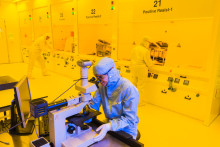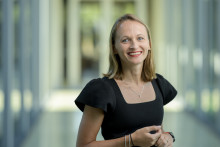Professor Ton Mouthaan is one of the hard-to-find people at the UT, his challenging job as director of education at the faculty of Electrical Engineering (EL) implies a lot of work and responsibility. This position and his experience with supervising PhD students at EL makes him the ideal person to talk to about the students and their future after the defence of their thesis.
Why would an MSc student chose to do his PhD at EL?
'Because electrical engineering is an interesting technological area and someone wants to be part of it. Electronics has been the motor of the enormous technological revolution that has taken place over the last 50 years. It is a privilege and a challenge to play a part in that!'
Would it give the student better chances in the labour market?
'There is a shortage world wide of electrical engineers. They are always in demand, when the economy is booming and when a recession hits.'
How would you describe a PhD student in EL?
'A person who is keen to design new applications in the field of electrical engineering for people to use. Therefore he, or she, has the fundamental attitude that something must be useful as an application coupled with the curiosity to actually make it. Few PhD students actually make things; they usually work on a very small part of a system yet the perspective is always that (sometimes faraway) system. Electrical engineers are systematic workers and tackle and define their research questions in a very ordered way; that must also be the habitus of an electrical engineering designer, as research is an essential element in the designing process.'
What do you think about the number of PhD students in EL. Is it increasing?
'Yes, and that is fantastic, but there is still so much to do.'
From your experience working with PhD students from all over the world what do they do after obtaining their PhD degree? Do they decide to stay in the Netherlands, or do they go abroad?
'That varies: some stay, some go back to their native countries. The electrical engineering sector is a global sector so this dispersion is to be expected. Most of them go into industry; there are not manypossibilities in universities. Some come back to the university after a spell in industry, which is very good.'








